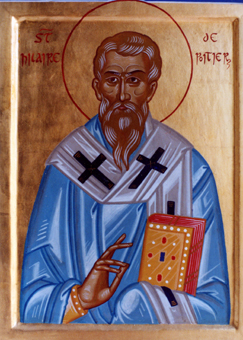The holy
Hierarch Hilary was born of pagan parents in Gaul, and was
trained in philosophy and rhetoric.
At a time
when paganism was still strong in Gaul, Saint Hilary
understood the falsehood of polytheism, and became a
Christian, and a great defender of his new Faith.
About the
year 350 he was ordained Bishop of Poitiers, when Arles and
Milan were in the hands of the Arians and the Arian
Constantius was sole Emperor. Like his contemporary Saint
Athanasius, Saint Hilary's episcopate was one long struggle
against the Arians.
As Bishop
of Poitiers, Saint Hilary foresaw the future greatness of
Martin (see Nov. 12), and attached him to himself. In 355,
when required to agree to the condemnation of Saint
Athanasius passed by the Council of Milan, Hilary wrote and
epistle to Constantius convicting the wrongs done by the
Arians and requesting, among other things, the restoration
of the Orthodox bishops, including Athanasius.
For this,
Hilary was banished to Asia Minor, where he wrote his
greatest work, On the Trinity.
Saint
Hilary returned to his See in 360, where
Saint Martin sought
him out again. It was at this time that Saint Hilary blessed
Martin to found a monastery near Poitiers, where Martin
remained until being consecrated Bishop of Tours in 371.
In his
last years, Saint Hilary strove for the deposition of
Auxentius, the Arian Bishop of Milan, but by affecting an
Orthodox confession Auxentius retained his See.
Saint
Hilary reposed in peace about the year 368. Auxentius died
in 374 and was succeeded by Saint Ambrose, who continued
Saint Hilary's battle against Arianism.
(Great
Horologion)

